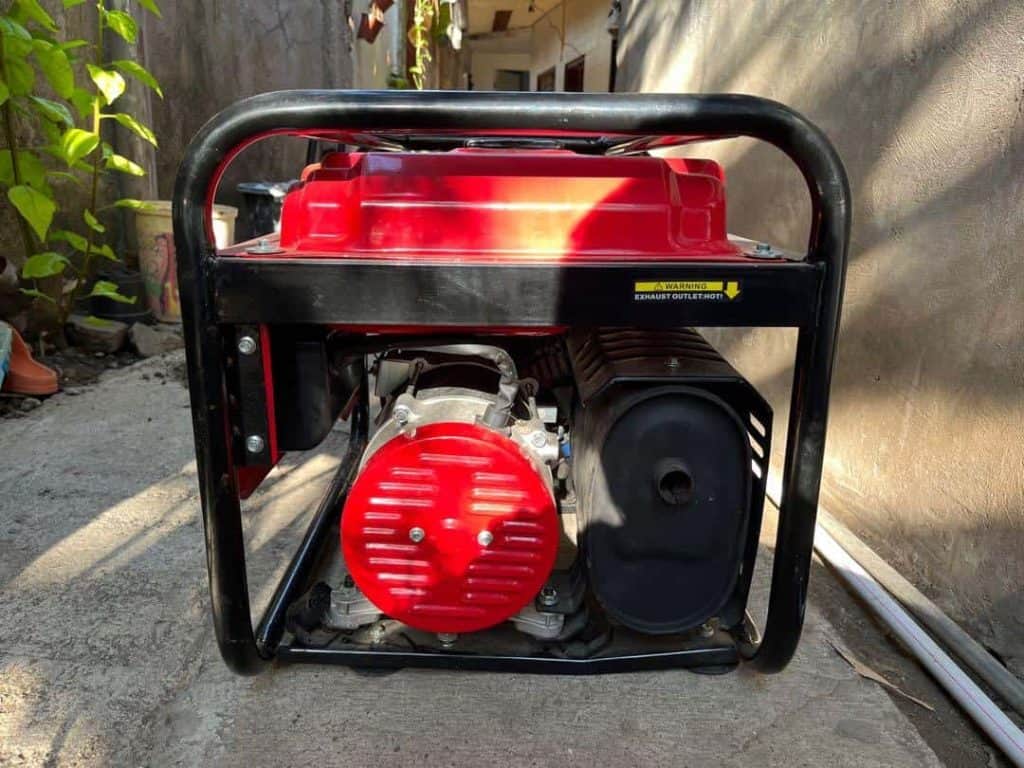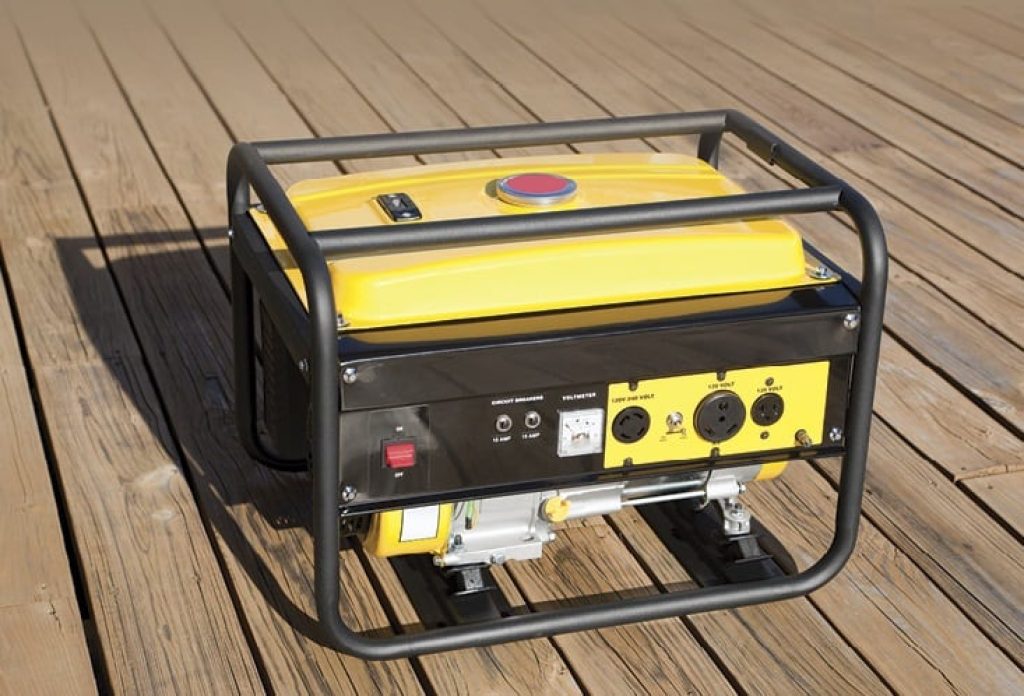
Every home should have a generator, which keeps you plugged in even when the power lines are down. It will keep your essential appliances running, prevent food spoilage, keep your home comfortable, and give you peace of mind during a power outage.
If you own a generator for your home or RV, you might be wondering how much gasoline does a generator use. Well, there are so many factors that affect the generator’s fuel rate consumption. These factors include generator type, load capacity, and type of fuel used.

How Much Gasoline Does A Generator Use
If you are running survival equipment, the average 5kW generator can consume 0.75 gallons of gas per hour. If you choose a bigger unit, the consumption will be much bigger. For example, a 75kW generator can consume six gallons of gas per hour on a full load.
It is also very simple to estimate how much gasoline does a generator use in a day. If you have a 5kW generator consuming 0.75 gal/hr, then the generator consumes up to 18 gallons of gas per day.
If you are curious about how much gas does a generator use, here’s the estimated fuel consumption of a diesel generator based on the generator’s size and load.
| Generator Size (kW) | ¼ Load (gal/hr) | ½ Load (gal/hr) | ¾ Load (gal/hr) | Full Load (gal/hr) |
| 20 | 0.6 | 0.9 | 1.3 | 1.6 |
| 30 | 1.3 | 1.8 | 2.4 | 2.9 |
| 40 | 1.6 | 2.3 | 3.2 | 4 |
| 60 | 1.8 | 2.9 | 3.8 | 4.8 |
| 75 | 2.4 | 3.4 | 4.6 | 6.1 |
| 100 | 2.6 | 4.1 | 5.8 | 7.4 |
| 125 | 3.1 | 5 | 7.1 | 9.1 |
| 135 | 3.3 | 5.4 | 7.6 | 9.8 |
| 150 | 3.6 | 5.9 | 8.4 | 10.9 |
| 175 | 4.1 | 6.8 | 9.7 | 12.7 |
| 200 | 4.7 | 7.7 | 11 | 14.4 |
| 230 | 5.3 | 8.8 | 12.5 | 16.6 |
| 250 | 5.7 | 9.5 | 13.6 | 18 |
| 300 | 6.8 | 11.3 | 16.1 | 21.5 |
| 350 | 7.9 | 13.1 | 18.7 | 25.1 |
| 400 | 8.9 | 14.9 | 21.3 | 28.6 |
| 500 | 11 | 18.5 | 26.4 | 35.7 |
| 600 | 13.2 | 22 | 31.5 | 42.8 |
| 750 | 16.3 | 27.4 | 39.3 | 53.4 |
| 1000 | 21.6 | 36.4 | 52.1 | 71.1 |
| 1250 | 26.9 | 45.3 | 65 | 88.8 |
| 1500 | 32.2 | 54.3 | 77.8 | 106.5 |
| 1750 | 37.5 | 63.2 | 90.7 | 124.2 |
| 2000 | 42.8 | 72.2 | 103.5 | 141.9 |
| 2250 | 48.1 | 81.1 | 116.4 | 159.6 |
Factors That Affect Fuel Consumption
So, how much gasoline does a generator use? Here are a few factors that can affect fuel consumption:
Generator Type
There are different types of generators, and they require different fuels too. Among the most popular types of generators are the following:
- Standby – Standby generators are meant for emergency use. They are large and consume a massive amount of gas. This generator is powerful enough to power your house for several hours.
- Portable – This type of generator is very convenient and easy to use. Depending on the size, portable generators can charge laptops and power several appliances.
- Inverter – Inverter generators are most suitable for powering electronics. They are small, and mostly they can be pre-charged using electricity.
- Tri-Fuel – For a more versatile feature, a tri-fuel generator is a perfect choice. As the name suggests, gasoline, natural gas, and liquid propane can be used as fuel.
Fuel Type
After determining the number of your appliances/devices and what generator to get, you need to consider the fuel type. The fuel consumption will help you understand how much gasoline does a generator use.
- Diesel – Diesel burns slower compared to other types of fuel. It is the most efficient option.
- Gasoline – It is one of the most available fuels but not as efficient as diesel.
- Propane – Similar to gasoline, propane is not difficult to find. It is also a highly versatile fuel type ideal for standby generators. Some propane generators can burn up to three gallons per hour.
- Natural gas – It is a cleaner alternative but not the most eco-friendly. It is best suitable for homes with natural gas lines installed. It also has a higher fuel consumption rate compared to diesel.
Here’s a quick comparison of how much gasoline does a generator use:
| Fuel Type | Kilowatts | Fuel Used Per Hour |
| Gasoline | 5kW generator | 0.75 gallons |
| Diesel | 8kW generator | 0.5 gallons |
| Propane | 6kW generator | 1.4 gallons |
| Natural Gas | 7kW generator | 118 cubic feet |
Load
It refers to the number of appliances/devices you have connected to the generator. You need to determine how much power you need to run your devices. Remember to consider the running watts and the additional starting watts in the overall wattage computation.
The more load you put on your generator, the more gas you need. It is always better to get energy-efficient appliances and devices.
Tips To Reduce Generator’s Fuel Consumption
If you care so much about how much gasoline does a generator use and you want to reduce the fuel consumption somehow, here are a few tips:

Power the necessary appliances only.
To save fuel, only run the necessary appliances. If you run your generator on 75% load, the fuel consumption is greater than when it is on 50% load.
Check the power requirement of essential appliances like lights, refrigerators, air conditioning, washing machine, dryer, etc. Also, make sure to switch off all the lights, devices, and appliances that are not in use.
Do not under-use your generator.
It is mentioned that using the generator on 75% load consumes more energy than on 50% load. It is also important to note that you should not under-use it. Do not run your generator on less than 50% load, as it will seriously affect its lifespan.
It is needed for the generator to achieve its best operating temperature. Otherwise, the engine will be put in jeopardy.
Servicing your generator is vital.
Just like your car, you need to service your generator on time if you want it to consume fuel at a lower rate. It is also important to check and replace oil. The generator will burn more energy if the oil is old and the filter is dirty.
Checking all parts of your generator as part of the service is also important to help protect it from damage.
Remove carbon deposits on time.
If not removed regularly, carbon deposits can harm the generator’s engine. Thus, remove carbon deposits as often as possible. Ideally, if you use your generator frequently, you should remove the carbon deposits every four months.
Carbon deposits can get to the valve seats, injectors, piston tops, and other parts of the engine.
Get a high-quality generator.
Invest in a high-quality, efficient generator that will save you more in the long run. Spending more money on a quality generator is always better, and you can get more features.
Use appliances and devices that consume less power.
Another way to save more fuel is to replace your refrigerator’s motor with a lower voltage compressor that uses less fuel and energy.
Also, ensure that the lights you use at home consume less energy when the generator is in use.
Lastly, use your stovetop to heat water instead of your water heater.
Safety Considerations

Here are some safety precautions when using your generator:
- Always turn off your generator and allow it to cool off before refueling. Gasoline is highly combustible, so the heat from the engine could cause a fire.
- When using your generator in a wilderness area, use it with caution. Gasoline is highly flammable. If the gas spills on the ground, cover it with dirt to prevent exposure in case of a wildfire.
- Keep the containers sealed and away from fire and heat.
Summary
How much gasoline does a generator use is greatly affected by the size of your generator, the fuel you use, and the load. Running a generator, especially for long periods, is not cheap, but if you want to save on fuel, only run the necessary appliances and devices.





